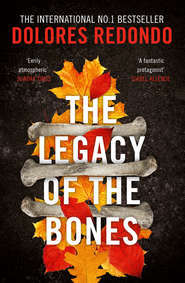По всем вопросам обращайтесь на: info@litportal.ru
(©) 2003-2025.
✖
Offering to the Storm
Автор
Год написания книги
2019
Настройки чтения
Размер шрифта
Высота строк
Поля
‘What sort of relationship did you have?’
‘He’s a good son,’ Yáñez replied, too quickly. ‘He did everything you’d expect a good son to do.’
‘Such as?’
This time Yáñez had to give it some thought.
‘Well, he gave me money … sometimes he did the shopping, bought me food – that sort of thing.’
‘That’s not what I’ve been hearing. People in the village say that after your wife died, you packed your son off to school abroad, and that he didn’t show his face around here for years.’
‘He was studying. He was a good student, he did two degrees, and a masters, he’s one of the top psychiatrists at his clinic …’
‘When did he start visiting you more frequently?’
‘I don’t know, about a year ago.’
‘Did he ever bring anything other than food? Something he kept here, or that he asked you to keep for him somewhere else?’
‘No.’
‘Are you sure?’
‘Yes.’
‘I’ve looked over the house,’ she said, glancing about. ‘It’s spotless.’
‘I have to keep it clean.’
I understand. You keep it clean for your son.’
‘No, for my wife. Everything is exactly the way it was when she left …’ Yáñez’s face twisted into a grimace of pain and grief. He remained that way for a few seconds, not making a sound. Amaia realised he was crying when she saw the tears roll down his cheeks.
‘That’s the least I could do; everything else I did was wrong.’
Yáñez’s eyes danced from one object to another, as if he were searching for an answer hidden among the faded ornaments standing on doilies and side tables, until he met Amaia’s gaze. He grasped the edge of the blanket, lifting it in front of his face for a few seconds, then flinging it aside, as though disgusted with himself for having cried in front of her. Amaia felt certain the conversation would end there, but then Yáñez reached behind the pillow he was leaning against and pulled out a framed photograph. He gazed at the image as if spellbound, then passed it to her. Yáñez’s gesture took Amaia back to the previous year, when, in a different sitting room, a grieving father had handed her the portrait of his murdered daughter, which he also kept hidden under a cushion. She hadn’t seen Anne Arbizu’s father since, but the memory of his pain had stayed with her.
A woman no older than twenty-five smiled at her from the picture. Amaia glanced at her, then handed the photograph back to Yáñez.
‘I thought we’d live happily ever after, you know? She was a young, pretty, kind woman … But after the boy was born she started acting strangely. She grew sad, she never smiled, she wouldn’t even hold him, she said she wasn’t ready to love the boy, and that he rejected her. Nothing I said did any good. I told her she was talking nonsense – of course the boy loved her – but she only grew sadder. She was sad all the time. She kept the house tidy, she did the cooking, but she never smiled; she even stopped sewing, and the rest of the time she slept. She kept the shutters closed, the way I do now, and she slept … I’ll never forget how proud we were when we first bought this place. She made it look so pretty: we painted the walls, planted window boxes … Life was good. I thought nothing would ever change. But a house isn’t the same as a home, and this became her tomb … Now it’s my turn, although they call it house arrest, and the lawyer says they’ll let me serve out my sentence here. I lie here every night, unable to sleep, smelling my wife’s blood below my head.’
Amaia looked intently at the sofa. The cover didn’t go with the rest of the décor.
‘I had it recovered because of the bloodstains, but they’d stopped making the original fabric so they used this one instead. Otherwise everything’s the same. When I lie here, I can smell her blood beneath the upholstery.’
‘The house is cold,’ said Amaia, disguising the shiver that ran up her spine.
He shrugged.
‘Why don’t you light the boiler?’
‘It hasn’t worked since the night of the storm, when the power went.’
‘That was over a month ago. You mean to say you’ve been without heating all this time?’
Yáñez didn’t reply.
‘What about the people from social services?’
‘I only open the door to the fellow who brings the trays. I told them on day one that if they come round here, I’ll be waiting for them with an axe.’
‘You have plenty of wood. Why not make a fire? There’s no virtue in being cold.’
‘It’s what I deserve.’
Amaia got up and went out to the shed, returning with a basket of logs and some old newspapers. Kneeling in front of the hearth, she stirred the cold ashes to make space for the wood. She took a box of matches from the mantelpiece and lit the fire. Then she sat down again. Yáñez stared into the flames.
‘You’ve also kept your son’s room just as it was. I find it hard to imagine a man like him sleeping there.’
‘He didn’t. Occasionally he stopped for lunch, and sometimes supper, but he never spent the night. He would leave, then come back early the next day. He told me he preferred a hotel.’
Amaia didn’t believe it; they had found no evidence of Berasategui staying at any of the hotels, hostels or bed and breakfast places in the valley.
‘Are you sure?’
‘I think so, but I can’t be a hundred per cent sure – as I told the police, my memory is worse than I let on to social services. I forget things.’
Amaia plucked her buzzing phone from her pocket. The display showed several missed calls but she ignored them, scanning through her photos until she found the right image, then touching the screen to enlarge it. Averting her eyes from the photo, she showed it to Yáñez.
‘Did your son ever come here with this woman?’
‘Your mother.’
‘You know her? Did you see her that night?’
‘No, but I’ve known your mother for years. She’s aged, but I recognise her.’
‘Think again, you just told me your memory isn’t so good.’
‘Sometimes I forget to have supper, or I have supper twice because I forget I’ve already had it, but I remember who comes to my house. Your mother has never set foot in here.’
She slipped the phone back into her coat pocket, replaced the dining chair, pulled the shutters to and left. As soon as she was in the car, she reached for her phone and, ignoring the insistent buzzing, dialled a number from her contacts list. After a couple of rings, a man answered.
‘Could you please send someone to fix a boiler that broke down on the night of the storm,’ she said, and gave him Yáñez’s address.
3 (#ua3e92a81-94f0-5908-bd3c-8a54345460b6)
By the time Amaia parked in the square next to the Lamia fountain, the drizzle had turned to a downpour. She pulled up the hood of her coat and hurried through the arch into Calle Pedro Axular, following the sound of raised voices. The anguish and urgency of those missed calls was reflected in Inspector Iriarte’s face as he struggled to contain a group of people intent upon approaching the patrol car. In the rear passenger seat, a weary-looking individual was sitting with his head propped against the rain-beaded window. Two uniformed officers were unsuccessfully attempting to cordon off the area surrounding a rucksack, which lay on the ground in the middle of a puddle. Amaia took out her phone and called for back-up as she hurried over to assist them. Just then, two more patrol cars advanced across the Giltxaurdi Bridge, distracting the angry mob, whose shouts were momentarily drowned out by the wailing sirens.











